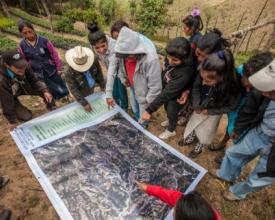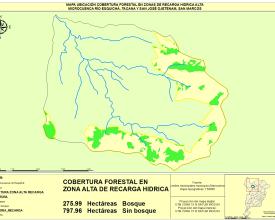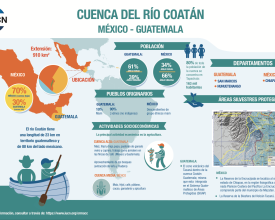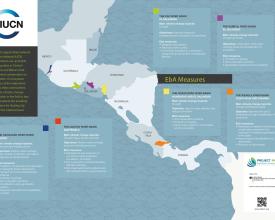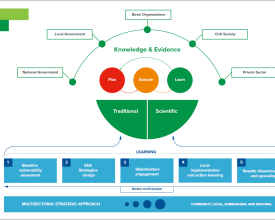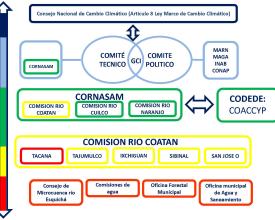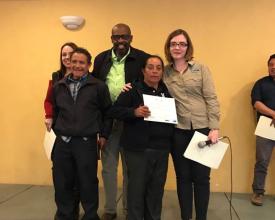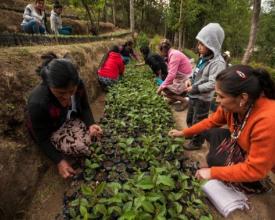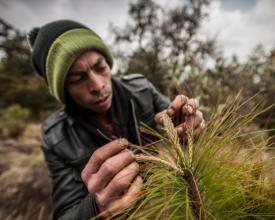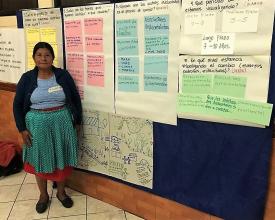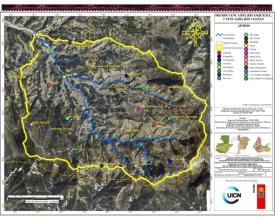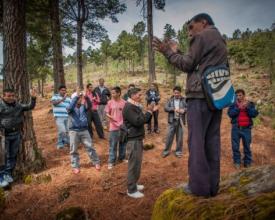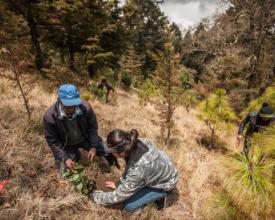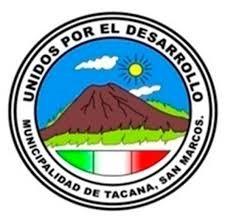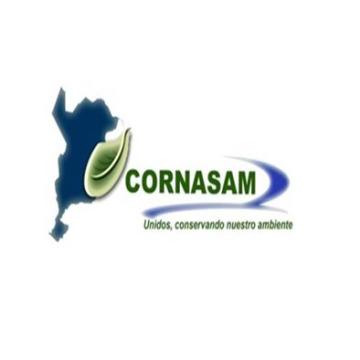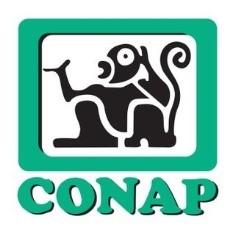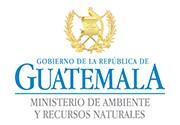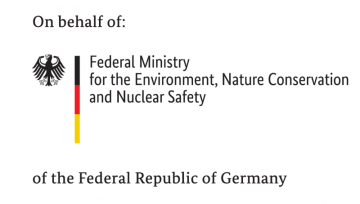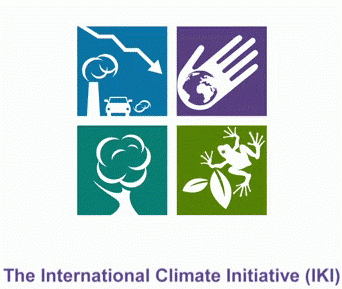
Governance for adaptation in the Guatemalan highlands
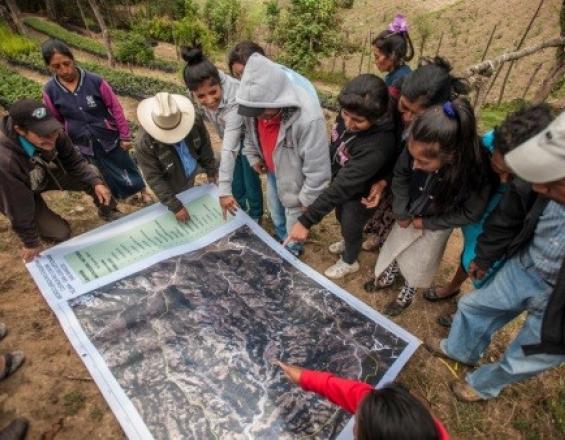
The indigenous population of the Esquichá River micro-basin (Tacana Municipality, in the upper part of the Coatán River basin) lives with high rates of poverty and climate vulnerability. The micro-basin (38 km2) shows tendencies of deforestation, pine weevil pest damage, soil erosion, variations in rainfall, strong winds, droughts and frosts, which increase the risks of landslides and loss of goods. In order to address these challenges, the needs of communities regarding the restoration, protection and reparation of forests, and productivity, required attention. For this, the governance of the micro-basin was strengthened under a multi-dimensional, participatory, flexible and ecosystemic approach. The solution combines these 4 elements to strengthen communal and municipal capacities for natural resource management; manage water recharge zones as an adaptation strategy. As a result, the municipality of Tacaná will allocate resources for EbA measures under the Development Plan.
Context
Challenges addressed
- Indigenous farming communities are vulnerable to climate change impacts (strong variations in rainfall patterns, hurricans, strong winds, droughts, frosts; causing landslides, soil erosion, loss of crops, damage to infrastructure)
- Farmers have low education and high poverty, which may cause less access to weather information, and other factors increasing their adaptive capacity. Few economic opportunities in the area, limit implementation of agri-technologies
- Forests are facing strong pressures, including those that harbour water sources, pine weevil threats, others under customary systems
- Gaps in application of laws and regulations for water and natural resource management(Constitution, Municipal Code, Health Code, Forestry Law)
- Need to improve coordination between different administrative jurisdictions, multiple levels of government (community, municipal, departmental, regional, national) and different sectors, for more integral adaptation actions
Location
Process
Summary of the process
Governance for EbA refers to how power is exercised, responsibilities are distributed and decisions are made to respond to climate change with nature based solutions. This solution proposes a governance model that is multidimensional (BB1), participatory (BB2), flexible (BB3) and with an ecosystem approach (BB4).
- BB1, articulation among municipalities, communities and the national institutions was enhanced to ensure access to forest incentives.
- BB2, governance was reinforced in order to be more inclusive and favour local empowerment, especially of women; therefore expanding local participation.
- BB3, measures have been monitored and evaluated in order to take informed decision making and influence policy and management instruments in regards to future uncertainities on the extent of climate change impacts/climate-related impacts.
- BB4, the ecosystem approach was integrated into local municipal planning
Building Blocks
Achieving multi-dimensional governance for adaptation
The Esquichá River Micro-basin Council acts as a platform for dialogue, advocacy, capacity building and appropriation of lessons learned and tools; therefore, it is a key means for up-scaling EbA to different levels. With a view of vertical scaling, lessons of its work have influenced different levels:
- the Municipality of Tacaná that will include EbA measures into municipal planning.
- the Coatán River Council (only with national Guatemalan authorities) which facilitates inter-sectoral cooperation and management with a basin-wide vision, beyond the mere political-administrative sphere.
- the Coordinator of Natural Resources and Environment of San Marcos Department (CORNASAM). CORNASAM coordinates the efforts of governmental actors and NGOs, as well as the municipalities of the Department of San Marcos.
- the National Secretary of Planning (SEGEPLAN) in order to improve guidelines given to municipalites planning.
- the Ministry of Environment (MARN), that is using lessons learnt to scale up a Green Climate Fund project that implements EbA measures.
- the Forest Institute (INAB)
Further work is needed to have a binational coordiantion of the Coatán river basin, shared among Guatemala and Mexico to have a higher impact on the benefits of EbA.
Enabling factors
- Using traditional knowledge and local experiences to select EbA measures, enabling the application of EbA
- The participatory structure of the Esquichá River Micro-basin Council, which is made up of the Community Development Councils of local communities, fostered the possibility of working in an organized manner and influencing higher levels (e.g. Municipal Councils).
- The existence of CORNASAM since 2004 was an enabling factor, since the purpose of this platform aligns well with the objective of improving adaptation capacities in the micro-basin
Lesson learned
- Platforms such as CORNASAM are ideal for strengthening adaptation governance, since they bring together national and sub-national institutions and authorities from different sectors (vertical integration). CORNASAM seeks to reduce isolated approaches and aims to facilitate the identification of mutual benefits and synergies between sectors and their adaptation needs (horizontal integration).
- Governance for EbA must promote open, equitable, respectful, and effective participation, so that planning and decision-making processes are enriched by the participation and the results are accepted by all parties involved.
Achieving participatory governance for adaptation
To strengthen governance, improvements needed to be made in the participation of government and local stakeholders in the management of the micro-basin.
At the local level, the organizational base of the communities was reinforced, through community leaders and their understanding of the importance of water recharge areas. It was further supported by the Communal Forestry Nursery Commissions, generally administered by women; and the Community Development Councils, which were more strongly integrated into the Esquichá River Micro-basin Council. Thus, participation was catalyzed from the bottom up, notably with youth also participating, especially in reforestation events that entailed >1000 people.
The role of the state also increased through dialogues and agreements with municipalities, and access by communities to forest incentives. The greatest added value was a local empowerment achieved by social mobilization (including women), "action learning" (process that involves the implementation of EbA activities, coupled with a practical capacity building program), organizational capacity, community and micro-basin governance processes. What has been achieved is a reflection of a strong community commitment thanks to participatory governance.
Enabling factors
- Climate change related impacts, and in particular the availability of water, are factors of concern to most micro-watershed stakeholders. This awareness increases their willingness to participate in dialogue processes, constant learning, the search for solutions and joint actions. In Esquichá, extreme weather events in previous years had strongly impacted several communities, causing damage to both assets (e.g. crops, housing, productive infrastructure) and water resources.
Lesson learned
- The Esquichá River Micro-basin Council brings together: municipalities, COCODEs (Community development councils), Communal Forestry Nursery Commissions and municipalities representatives. Pledging to strengthen these communal structures was highly effective, given that the greater organizational capacity and female leadership in the communities helped to consolidate the governance of the Micro-basin Council.
- The empowerment of women benefits the management of natural resources and the social cohesion of communities. In the arena of the Communal Forestry Nurseries Commissions, women felt they had much to contribute and having taken ownership of these spaces, their confidence to take part in other structures increased as well.
- Women learnt that they can take action, and are key actors in promoting forest restoration for water recharge. They learnt that collective action and leadership is needed for restoration scale actions.
Achieving flexible governance for adaptation
Governance options and responses for adaptation to climate change are new and must be constantly evolving; desicions and governance pklan need to be flexible; hence adaptation must move forward under a flexible approach. This is possible with the application of EbA measures with a "learning by doing" while using best available sicientific information on climate scenarios and informing policy local and national instruments.
Climate vulnerability in Esquichá was assessed using the CRiSTAL tool ( “Community-based Risk Screening Tool – Adaptation and Livelihoods.")
After a first planing of EbA activities, actions for integrating flexibility were:
- The periodic evaluation of field EbA actions and the adoption of short-term decisions
- Monitoring and evaluation results will be key to include important adjustments
- Inclusion of EbA measures in the Microbasin Management Plan
- Assessment of measures to inform the municipality Development Plan.
- Informing of results to competent authorities as the municipality of the Forest Institute (INAB). This has lead INAB to seek tools to improve the way incentives are assigned and to identify communities located in key water catchment areas.
Enabling factors
- Political interest in mainstreaming EbA and water security criteria into forest incentives programs has grown.
- Political interest of the municipality of Tacaná.
- Tecnical capacity of the municipality of Tacaná.
Lesson learned
- The information must integrate the sciences (physical, biological, economic and social) with traditional and indigenous knowledge.
- The "action learning" or “learning by doing” approach is a key part of achieving flexibility in adaptation governance. Constant improvements should always be sought and those practices, strategies and policies that contribute to increasing socio-environmental resilience should be appraised. As a result of this approach, members of the Esquichá River Microbasin Council are more aware, on the one hand, of the legal and policy frameworks that facilitate multidimensional governance and the articulation required to address climate change and, on the other, of the need to monitor and evaluate, over time, the benefits that ecosystems bring for adaptation and local livelihoods.
Resources
Achieving ecosystem approach for adaptation
Under an ecosystem-based adaptation approach and a micro-basin vision, efforts in Esquichá focused on improving livelihoods and ecosystem resilience in order to reduce climate change vulnerability. Tropical storms and hurricans such as the Stand affected communities in the past (water infraestructure, erosion or loss of water springs). Applying an ecosystem approach was part of strengthening governance for climate change adaptation in the Esquichá micro-watershed.
Measures implemented are:
- protection and recovery of forests in water recharge zones. E.g. protection of pine forests (Abies guatemalensis) that harbour water sources that supply populations in the lower part of the micro-basin.
- Restoration of degraded lands and stabilization of slopes
- Implementation and optimization of agroforestry systems.
Additionally, there was broad acceptance of the need for a more integrated approach to water resource management, partly due to the water scarcity that communities suffer during the dry season and in the upper parts of the micro-basin. The concept of environmental social responsibility was also promoted among communities, whereby upstream communities take measures that benefit downstream communities.
Enabling factors
- Climate change, and in particular the availability of water, are factors of concern to most micro-watershed stakeholders, which increases their willingness to prioritize actions that favour water recharge zones and disaster risk reduction. In Esquichá, the occurrence of extreme events in previous years had strongly impacted several communities, causing damage to both assets (crops, housing, productive infrastructure) and water resources.
Lesson learned
- In order to proof the effectiveness of implemented EbA measures contributing to the climate change resilience of communities, and thereby building confidence in the strategy adopted, the first step was to promote reforestation in the upper parts of the micro-basin (where water sources are found) or in areas affected by landslides, as well as community work around forestry nurseries. These actions helped to consolidate the concept that forest cover is a "collective insurance" in the face of climate change.
- Valuing the ecosystem services of the basin helped to see adaptation as a task for all communities, a way to obtain benefits for both the Esquichá micro-basin as well as other communities located further down in the Coatán River basin.
Impacts
- Members of the Esquichá river micro-basin Committee unite and coordinate efforts to achieve the administrative and physical tasks needed to restore forest cover in priority water catchment areas.
- Communities incorporate EbA measures in the micro-basin’s Management Plan.
- With the support of the Municipality of Tacaná, communities influence higher levels (Municipal and Departmental Councils, National Forest Instute -INAB) for the allocation of financial resources. They are able to access forestry incentives for the restoration of forests affected by pests located in water recharge zones.
- Budgetary allocation from the Municipality of Tacaná for restoration projects in water recharge zones in the Esquichá micro-watershed, and inclusion of AbE in the updated Municipal Development Plan.
- Through the Coordinator of Natural Resources and Environment of San Marcos (CORNASAM), there is greater coordination among stakeholders in the basin, including NGOs executing projects in the Coatán River basin and San Marcos.
- Lessons are shared at a national scale with the Ministry of Environement and will be scaled up with a GCF project in the Guatemalan Highlands.
Beneficiaries
- Direct: 16 indigenous communities of the Mam ethnic group, living mainly on subsistence agriculture (~500 people)
- Indirect: 2039 families in the Esquichá micro-watershed (~12125 inhabitants)
- Municipality Tacaná
- Municipality San José de Ojetenam
Sustainable Development Goals
Story
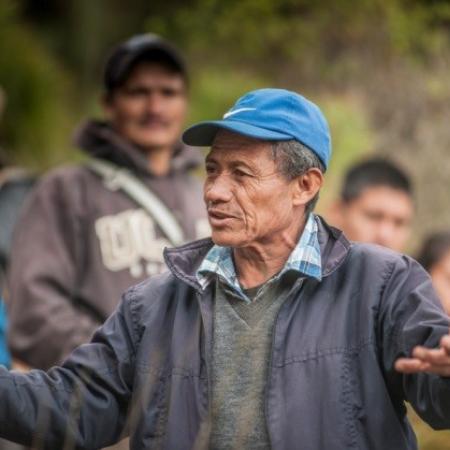
"Before, each community worked on its own and in its [own] space, now we are aware that working together we will obtain better results; now we have the participation of 16 communities in the meetings of the Esquichá Micro-basin Council and more than meetings, we carry out joint actions. All this effort is because we are all affected by climate change; not just a community ... but all of them, such as strong frosts, strong winds, prolonged droughts, intense rains, and we lose crops, among other things.
We went to knock on the doors of each community and tell them to accompany us to the meetings and we got a negative response, but that did not discourage us. And now we are happy with the great participation that we have, more so because we carry out actions jointly with the communities and what unites us, is water. Because if the communities do not take care of the upper parts, those affected are the ones in the lower part. And to see our territory as the Esquichá micro-watershed has helped us to integrate young people and women.
We have been recognized by the Ministry of Environment (MARN) for being one of the Microbasin Councils with the best results… we owe that to the accompaniment of the institutions; for example, before each institution came on its own and we had meetings at all time because they came disorganized. Now things have changed, in our meeting of the Council we have representatives of the municipality sitting there, such as the municipal forestry office, the women's office, the municipal office of water and sanitation, and also government organizations such as the National Forest Institute, the Ministry of Agriculture, MARN, and others such as United Nations and the International Union for Conservation of Nature. Now we do not feel alone and in these meetings we plan, manage and execute projects for the benefit of all communities.
It has meant a lot of effort, but now, to other communities that visit us and come to know our experience, we tell them what [...] they have to do. Because what has taken us the longest time, they can reduce it.
All this effort has opened doors for us at the municipal level (in the municipality of Tacaná), at department level and at the national level ... All this is reflected in the conservation of our natural resources -water, soil and forest - within the micro-watershed and everything leads to adaptation to climate change."
Mr. Roberto Escalante - President of the Esquichá River Micro-basin Council
